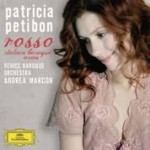Patricia Petibon is a singing whirlwind, a high, light coloratura who, like Natalie Dessay, has broken out of the gilded cage those types have invariably inhabited and become, magnificently, flesh and blood. Just because one doesn’t possess a large voice of many colors no longer means that chirping is the order of the day; Petibon is a superlative vocal actress, with what seems like a fiery temperament (could the “Rosso” title be a reference not only to her hair color but to her approach to her roles?).
She sings with more “face” than almost any singer currently on tap and she constantly surprises; her ornamentation is very much her own and despite an upper register that is stunning she’ll occasionally take a lower alternative if the text requires it.
The CD opens with an aria sung by Cleopatra from Sartorio’s Giulio Cesare in Egitto. It is a flirtatious, calculating piece in which Cleopatra, accompanying herself on castanets, brags that no man can resist her. It sits in mid-voice and Petibon uses it seductively, tossing in one or two staccato high notes, bending the tone in a bluesy fashion and eventually ending with a spoken whisper. It is daring, vivid, and very musical.
The second piece, Salome’s plea for kindness to Herod from Stradella’s San Giovanni Battista, starts with an absolutely straight, vibrato-free tone that epitomizes what we know of early music practice. Petibon keeps it soft and gentle, only occasionally using vibrato. Morgana’s “Tornami a vagheggiar”, from Handel’s Alcina, pulls out some wild flights of coloratura as well as true tenderness. I worried a bit when I noticed that “Lascia ch’io pianga” was next–it is so simple and requires a tone less bright than is usual from Petibon. But I needn’t have been concerned: taken quite slowly and accompanied as if from heaven by Andrea Marcon and his Venice Baroque Orchestra, Petibon uses a rounder, more sensual tone. Her legato is so full of sadness that you actually hear the weight of the words.
“Volate, amori” from Ariodante is almost an interlude of sheer delight; the girlish tone and fanciful decoration of the “A” section is delicious. “Piangero” from Giulio Cesare, particularly in the reprise, really comes close to tears, and without exaggeration.
The CD comes closest to sheer crackpottery with Griselda’s aria from Scarlatti’s opera. The plot is disgusting–the king keeps testing and humiliating Griselda to prove her love; but here Petibon gives us a ferocious picture of the wronged Queen, with whoops and sneers from both singer and orchestra. “Ah, mio cor” from Alcina dips into a dark part of Petibon’s voice, to what seems like genuine grief.
I’ve described the first eight tracks on the CD; the program varies fast and slow, intense with playful, simple with berserk. The remainder is just as impressive, with a hauntingly beautiful, death-welcoming aria from Porpora’s Quinto Fabio juxtaposed with a simile aria by Vivaldi from L’Olimpiade–Oh, those ships being tossed on icy seas! Chilly, dangerous, windswept strings and a ship/soprano that can handle any weather. There’s a repeated high-B near the end of the aria that is delivered four times in a tone so pure that it can make your brain ache; seconds later, after some coloratura madness, Petibon dips to the F-sharp two-and-a-half octaves below it.
As you’ve guessed, I can’t get enough of this CD or soprano. She is not our parent’s canary; much like the odd German soprano, Simone Kermes, she is somewhat eccentric and makes us listen differently. This CD is a gem; perfectly programmed, with only a few familiar items interspersed among the many worthwhile rarities, and all of it accompanied by Marcon and his band with élan. And the sound is glorious. Ignore this at your own risk. [8/24/2010]
































